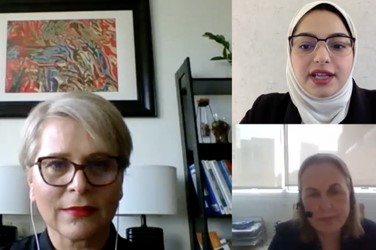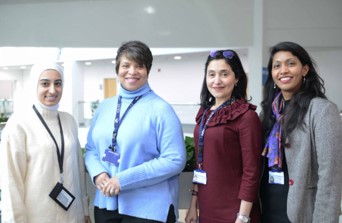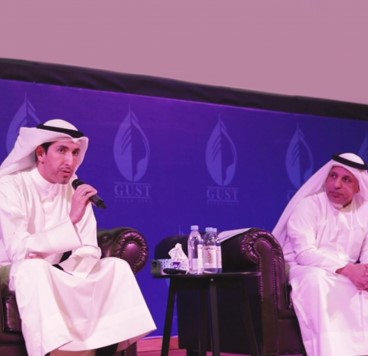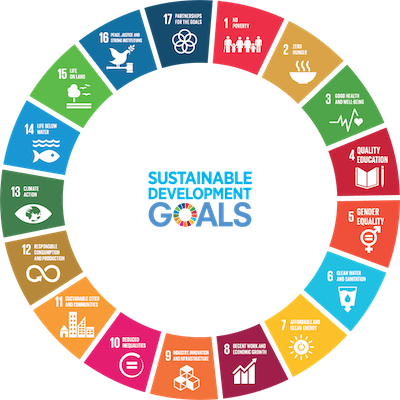SDG11: Sustainable Cities & Communities

In September 2015, the General Assembly adopted the 2030 Agenda for Sustainable Development that included 17 Sustainable Development Goals. These goals are designed to be a "blueprint to achieve a better and more sustainable future for all" through addressing global challenges, including those related to poverty, inequality, climate change, environmental degradation, peace and justice. In September 2019, Heads of State and Government came together during the SDG Summit to renew their commitment to implement the 2030 Agenda for Sustainable Development. During this event, they acknowledged that the first four years of the implementation of the 2030 Agenda included major progress, but that overall, the world is not on track to deliver the SDGs.
SDG 11 addresses slums, human settlement management and planning, climate change mitigation and adaptation, and urban economies. Prior to the adoption of the 2030 Agenda, Millennium Development Goal 7, target 4, called for efforts to achieve a "significant improvement in the lives of at least 100 million slum dwellers" by 2020.
In 2008, for the first time in history, the global urban population outnumbered the rural population. This milestone marked the beginning of a new 'urban millennium' and, by 2050, two-thirds of the world population are expected to be living in urban areas. The number of urban residents increases by nearly 73 million every year, and it is estimated that urban areas account for 70 per cent of the world's gross domestic product, generating a large share of economic growth. Thus, sustainable development cannot be achieved without significantly transforming the way we build and manage our urban spaces.
The unprecedented growth of cities, coupled with increasing rural to urban migration resulting from a combination of "push" and "pull" factors, has led to a boom in mega-cities, especially in the developing world. In 1990, there were ten mega-cities with 10 million inhabitants or more, and in 2014, there were 28 mega-cities, home to a total of 453 million people. Slums are also becoming a more significant feature of urban life. Between 2000 and 2014, the absolute number of people living in slums went from 792 million in 2000 to an estimated 880 million in 2014. Most of them are found in Eastern and South-Eastern Asia. In the next 30 years, 90% of urban growth is anticipated to happen in Asia and Africa. Rapid urbanization worldwide is exerting pressure on fresh water supplies, sewage, the living environment, and public health.
The vast majority of research that pertains to the topic of SDG 11 comes from the United States, United Kingdom and China. Environmental science and social sciences fields see the most research with regard to Sustainable Development Goal 11, followed by medicine, energy and engineering.
Make cities and human settlements inclusive, safe, resilient and sustainable. GUST doing different collaborations, offering these courses that give knowledge in the fields to students, staff and the general public.
GUST Holds Student-Led Conference on "Increasing Student Motivation and Engagement in Online Courses"
Gulf University for Science and Technology's Department of Education held its third student-led conference this week which was titled "Increasing Student Motivation and Engagement in Online Courses". The event brought together in service and pre-service GUST Education students and alumni members to discuss student motivation and engagement in online courses. The conference, which took place from the 4th to the 6th of January, was held on the Microsoft Teams platform and hosted nine webinars tackling different topics.

The online conference focused on the key considerations needed to ensure an engaging and motivational learning environment when teaching in nontraditional online classes. While online teaching and learning is based in the same solid principles of face-to-face teaching, it requires additional considerations when it comes to increasing student motivation and engagement. Teachers need to tailor a particular nature of content delivery, learning activities, and assessments.
The virtual conference, which was kicked off with a welcoming speech by Assistant Professor of Educational Psychology at GUST Dr. Florentina Halimi, included nine webinars covering several different topics on the matterm, all given by GUST students and alumni. Participating lecturers presented their ideas and various teaching strategies that utilize technology to support student learning, and presented some teacher instructional methods and techniques for online classes. These webinars included subjects such as 'Strategies to Increase Student Engagement in Middle and High School Online Learning' by Leila Farhat and Shahed Almatawha, 'Using Apps to Enhance Distance Learning' by Naser Shahada and Mohammad AlShakhas. 'Boosting Student Participation Online with Collaborative Activities' by Aishah AlMekhaizeem and Maryam Metaeb, 'Tools for Online Learning & Strategies for Student Engagement' by Malak Khalaf, 'Using Imaginary Ball Teaching Strategy in Online Classes to Do More than Gamify a Lesson' by Yara Zukari, and 'Interactive E-Learning Web Apps for Online Classroom' by Athoub Aldhufiri.
The conference successfully showcased the latest and most interesting findings in online teaching and learning, and gave an opportunity for GUST members to share their management approaches, pedagogy, and best practices. It also presented a great opportunity for current GUST students to develope connections in the field by networking with experienced alumni members, further aiding in the development of educational innovation through increased communications and advocacy.
GUST Instructors Present at ELearning & EFLTalks Online Workshop
GUST Math Foundation Program Unit (MFU) Instructors, Shiny Verghese, Waila Al-Essawi and Anwar Al-Zayer, presented at the online event 'EFLTalks: Improving Student's performance in the MENA Region', which took place earlier this month.

The event was done in a collaboration between ELearning MENA and EFLTalks.
The webinar focused on strategies and best practices to improve student performance in the classroom, and specifically with students in the MENA region. Shiny Verghese shed light on a variety of different team-based learning using technology which could encourage students to be more engaged in the material they are learning in class. Anwar Al-Zayer discussed the rise of PADLET, and the pros and cons of using it in the classroom. GUST's participation ended with Waila Al-Essawi delving into Panopto lecture-capture and how instructors can use it to add value to their curriculum.
Our instructors' participation in the event allowed for the university to be represented in one of the most powerful ways - the quality of our faculty. The event was organized in a collaboration between Elearning MENA and EFLTalks. ElearningMENA promotes a community in the MENA region by encouraging educators and students to integrate effective, emerging and electronic (3Es) learning skills in ALL fields. Run by volunteers ElearningMENA's activities include; monthly onsite and online professional development sessions, a venue for educational institutions/companies to showcase their technology-based resources and products, publish online publications periodically and expand E-learners networking through collaborations with other entities worldwide. While EFLtalks provides an opportunity for teachers to teach other teachers. It provides a lasting legacy of free, fast and engaging teacher development available anytime, anywhere, through 10-minute videos.
SEED Hosts First Seminar "Are we heading toward changes in water and electricity prices in Kuwait"

The Center for Sustainable Energy and Economic Development (SEED) at Gulf University for Science and Technology (GUST) hosted its first seminar of the 2021/22 academic year titled "Are we heading toward changes in water and electricity prices in Kuwait?". The two key speakers of the seminar were Instructor of Economics and Finance, Dr. Osama Al-Falah and Senior Analyst at Al-Khafji Joint Operations, Mr. Mohammad Ramadhan, who tackled a various questions regarding Kuwait's economic future with water and electricity.
Both speakers tackled topics such as why should Kuwait increase its water and electricity prices and how does it compare geographically in the region? This seminar was organized in coordination with the Economics Club, as a part of their "Sustainability Week" shedding light on energy and sustainability.
GUST for SDGs specific researches on sustainability
- Yuan, Yufei, et al. "Dust events and indoor air quality in residential homes in Kuwait." International journal of environmental research and public health 17.7 (2020): 2433
- Dar, Muneer Ahmad, Aadil Askar, and Sameer Ahmad Bhat. "Blockchain based Secure Data Exchange between Cloud Networks and Smart Hand-held Devices for use in Smart Cities." 2022 International Conference on Artificial Intelligence in Information and Communication (ICAIIC). IEEE, 2022
Education for SDGs specific courses on sustainability
Have dedicated courses (full degrees, or electives) that address sustainability and the SDGs.Courses Related To SDGs
CAS = Collage of Arts and Sciences, CBA = Collage of Business Administration
| SDG | Collage | course |
|---|---|---|
| SDG 11 - Sustainable Cities & Communities | CBA | ECON 101 Principles of Microeconomics Topics: Negative Externalities such as Pollution and Global Warming This course is an introduction to the determinants of household demand, production and cost, and market prices. The principles of individual decision-making behavior in relation to understanding goods, services, and resource markets will be examined. |
| SDG 11 - Sustainable Cities & Communities | CBA | ECON 102 Principles of Macroeconomics Topics: Growth and Issues of Sustainability This course is an introduction to the determination of levels of, and changes in, aggregate income, output, employment, and prices. Course material will cover economic principles of choice related to the formulation and achievement of public policies that affect national employment, income distribution, and economic growth. |
| SDG 11 - Sustainable Cities & Communities | CBA | ACCT 495 Special Topics in Accounting Topics: Sustainability and Environmental Accounting, Chapter 11 The course: (i) describes the commonly used guidelines for sustainability reporting and evaluate the corporate sustainability performance, (ii) outlines the range of stakeholders that can influence sustainable business practices and business can get engaged with these stakeholders, (iii) explains how entities can use environmental management systems to improve environmental performance and reporting, and (iv) evaluate the implications of climate change for accounting education and research. |
| SDG 11 - Sustainable Cities & Communities | CBA | ACCT 410: International Accounting and Multinational Enterprises Topics: Corporate Social Responsibility, Chapter 5 The course: (i) emphasizes the importance of reporting to "stakeholders": employees, customers, suppliers, governments, activist groups, the general public, in addition to investors, (ii) explains the measurement and communication of information about a company's effects on employee welfare, the local community, and the environment, and (iii) outlines the integrations of "Sustainability" reports with economic, social, and environmental performance - the so called "Triple Bottom Reporting" which addresses profits, people and planet. |

 Main Page
Main Page Download PDF
Download PDF